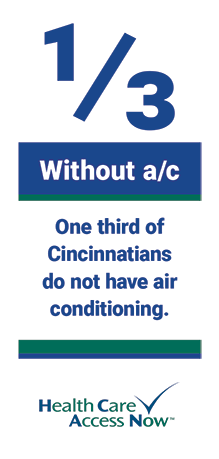Poverty, heat, and illness in Cincinnati

It’s been a hot summer in Cincinnati. With temperatures hitting 90 degrees or higher for several days in a row and little respite between heat waves, many people are hurrying from one air-conditioned space to the next.
But for some people, air conditioning comes at a premium. Not only are neighborhoods with a lower median wage more likely to act as heat islands, but the people who live there are less likely to have consistent access to air conditioning.
When you live in a heat island, air temperatures rise to between 4 and 10 degrees warmer than in other neighborhoods in the same city. So, it takes that much more energy to cool a space. That means people with less (or no) money to spend on energy must make choices between things like medication, food, and the energy bill.
For those living in poverty, there often is no choice other than to endure the heat.
What excessive heat does to the human body
A heat wave can cause greater ozone pollution. Exposure to ozone “can cause immediate breathing problems and lead to serious health effects over time—even early death.”
And it’s not just about pollution: “Breathing in hot, humid air can exacerbate respiratory conditions like asthma and COPD,” according to the American Lung Association.
A typical recommendation for those suffering with lung issues is to stay inside an air-conditioned space when the heat gets to be too much. But “[p]eople that are most vulnerable to heat…are often the ones with the least access to cool spaces,” according to an interview with Gregory Wellenius, Boston University (BU) professor of environmental health and director of BU’s Program on Climate Change and Health. Those he lists as being at higher risk include “elderly people, pregnant women, [and] those with certain preexisting diseases.”
Issues like heat exhaustion and dehydration certainly are more likely to occur during hot weather, but, “[kidney] problems, skin infections, and preterm birth among pregnant woman,” are more prevalent.
Hot weather affects the body and the mind—for people of all ages. Kids tend to perform worse on standardized tests, and adults are more likely to make mistakes that lead to injury.
What can be done
Certain Cincinnati recreation centers, pools, and public libraries are open to act as cooling centers during heat advisories. Free fans and air conditioners are available to people who qualify through St. Vincent DePaul’s Summer Breeze program in Northern Kentucky.
The Summer Crisis Program “provides assistance with electric utility bills (up to $500), a payment, or the purchase of an air conditioning unit and/or fan…or combination benefit,” as well.
All of this helps, but it doesn’t completely fix the issue. Health Care Access Now’s Community Health Workers help connect clients with available resources and provide education. Still, some people suffer more through hot weather in Cincinnati than others.







